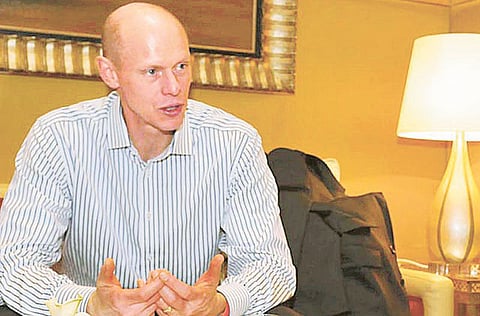Region needs global collaboration
Middle East has a lot to learn from emerging markets to achieve long-term growth

Dubai: The Middle East region needs to learn and align with the leading emerging markets of the world to address some of its socio-economic issues that have resulted in unrest across the region, Mark Otty, Area Managing Partner for Europe, Middle East, India and Africa of Ernst & Young told Gulf News in a recent interview.
Global economies are so tightly interconnected that companies, governments and industries will soon be forced to cooperate in ways that could not be imagined just a few years ago.
Otty believes that given the economic and demographic compulsions currently facing the Middle East, the region will have no choice but to collaborate with the rest of the world to find solutions for some of the key issues such as diversification of economies, youth unemployment, developing local skills through education.
The Middle East has an abundance of capital. The region is rich in natural resources with significant reserves of oil and gas.
As far as the population is concerned, the region has a very young population that contributes to both demand and supply sides of the economy as they drive both consumption and production.
Opportunities
"Given this context, the big challenge for the region is to utilise the oil and gas resources to create balanced economies that support employment and sustainable production bases. One of the prerequisites to create employment is to create industries and businesses while equipping people with skills and education, so that they can capture these opportunities," said Otty.
The Ernst & Young official thinks that in an interconnected world, the Middle East has a lot to learn and co-operate with other parts of the world to achieve long-term sustainable growth. What is important for the Middle East is to connect with other emerging markets of the world, because that is where a lot of value is going to be created. Estimates show that 70 per cent of world growth over the next few years will come from emerging markets, with China and India accounting for 40 per cent of that growth. The International Monetary Fund forecasts that the total GDP of emerging markets could overtake that of the developed economies as early as 2014.
Global trend
As emerging markets gain in stature, new companies are taking centre stage. The rise of these emerging market leaders will constitute one of the fastest-growing global trends of this decade.
"Economic expansion in rapidly developing economies is forcing companies from developed markets to reassess their business models.
"Emerging markets will provide opportunities for significant revenue growth as well as a source of talent, true innovation and ground-breaking approaches to business. "Just as important, these markets are also creating new global challengers."
Global trends
Six key developments are shaping the business world, according to new retracking global trends from Ernst & Young.
The report, which looks at broad long-term developments, also identifies the three underlying drivers that have helped establish and perpetuate each trend.
1. Emerging markets increase their global power
2. Cleantech becomes a competitive advantage
3. Global banking seeks recovery through transformation
4. Governments enhance ties with the private sector
5. Rapid technology innovation creates a smart, mobile world
6. Demographic shifts transform the global workforce
Sign up for the Daily Briefing
Get the latest news and updates straight to your inbox



